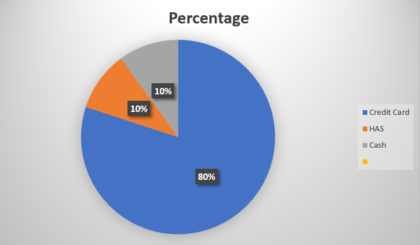We often get asked about charging fees for credit card users. While it can be quite difficult to determine whether or not you can add a fee—i.e. a convenience fee or a surcharge—to a customer’s credit card transaction (and then having to determine just how much to charge!), we’ve outlined some basic tips and best practices to help you get started.
1. Surcharge
A surcharge is a fee that’s added to a card transaction, either as a set amount or a percentage of a transaction. Typically, they are used to cover the cost of the merchant service charge.
Surcharges are banned in the following states:
• California (Appeals pending)
• Colorado
• Connecticut
• Florida (Appeals pending)
• Kansas
• Maine
• Massachusetts
• New York
• Oklahoma
• Texas
Surcharge Rules:
• Applicable only to credit card transactions, not debit or prepaid card transactions.
• The surcharge cannot be greater than the merchant’s average discount rate for that brand’s credit card transactions.
• Maximum surcharge allowed is 4%.
• Cardholder must be notified of the surcharge.
• Surcharge must be listed on the receipt as a line item and the primary payment amount must be processed together as one transaction.
2. Convenience Fee
A convenience fee is a fee charged for the “convenience” of being able to pay using an alternative payment channel outside the merchant’s customary payment channel.
Any merchant can charge a convenience fee IF the fee charged is for the legitimate convenience of being able to pay using a different payment channel than the merchant’s usual payment channel.
Example: Your customary payment channel is face-to-face or card present. You provide an alternative payment channel, such as the option to pay by phone using a credit card. You could then potentially charge a convenience fee along with the payment.
Mail Order/Telephone Order (MOTO) merchants and ecommerce merchants, whose customary payment channel is exclusively non face-to-face or card-not-present, are NOT permitted to charge convenience fees.
Convenience Fee Rules:
• Customer must be notified of the convenience fee prior to finalizing payment and given the opportunity to cancel.
• Payment must take place through an alternative payment channel.
• The fee can only be added to a non face-to-face transaction. Must be flat or fixed, regardless of the value of the payment due.
• The fee must be applied to all means of payment accepted through the alternative payment channel. Must be included in the total transaction amount.
These rules, exceptions and state laws must be observed to ensure compliance.
For more information regarding these rules issued by Visa, MasterCard or Discover, please visit:
• Visa
• MasterCard
• Discover
We hope this has been helpful but we’re always available to talk if you need any further assistance with your merchant account: please call 321-800-6533 or e-mail john@merconserv.com.
As always, we look forward to serving you.

